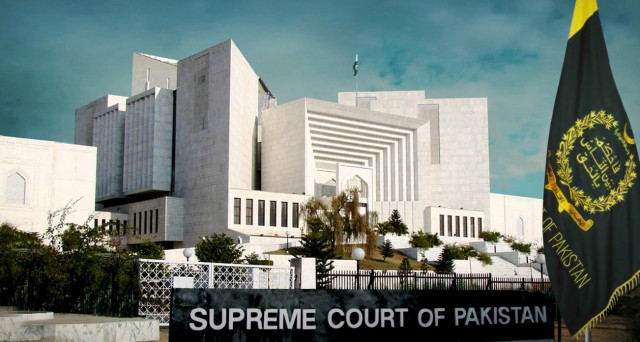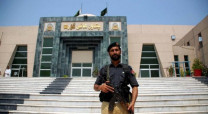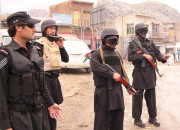Supreme Court reserves judgment
Verdict on 18th amendment to be pronounced at appropriate time, announced CJ.

“The verdict would be announced at some appropriate time later,” Chief Justice Iftikhar Muhammad Chaudhry, who headed the 17-member larger bench of the apex court hearing multiple challenges to the piece of legislation, announced.
He also dismantled the bench constituted especially for the hearing of this important constitutional case about four month ago.
Around 16 petitioners including Supreme Court Bar Association, Lahore High Court Bar Association, District Bar Association Rawalpindi, Abdul Hafeez Pirzada, Nadeem Ahmed Advocate and Barrister Zafrullah Khan had challenged the 18th amendment to the extent of Article 175-A in the Constitution, praying the apex court to declare it ultra vires of the Constitution.
On Thursday Rashid A Rizvi, counsel for Sindh High Court, and Abdul Hafeez Pirzada completed their arguments.
During the course of hearing the judges in their remarks said that it is up to the parliament to amend the Constitution and set any amendment right.
Rashid A Rizvi argued that the judiciary in Britain had no power regarding judicial review prior to 1998; accordingly, the parliament of the country was said to be supreme. He contended that attorney general and law minister should be expelled from the committee and the commission meant for the appointments of superior court judges.At this, Justice Khalilur Rehman Ramday said this is the procedure not to save the amendment but to butcher it. Justice Jawwad S Khawja observed that the court cannot say who must be expelled and included, as this is the job of the parliament to‘re-engineer’ the issue. He remarked that the court could not barge into the limits of the parliament, as the parliament is there to set right the Constitutional amendment.
Justice Saqib Nisar observed that it is the constitution that empowers the parliament to effect Constitutional amendment.
Justice Khalilur Rehman Ramday said the commission for the appointment of judges was made in Britain in isolation from the executive; but, in Pakistan, the same commission is being instituted at the heart of the executive. Senior lawyer Abdul Hafeez Pirzada said the court has the constitutional jurisdiction to strike down amendments made in the basic structure of the constitution. He submitted that this court had ruled in the Syed Zafar Ali Shah case that even in time of emergency, fundamental rights cannot be suspended. He contended that Article 175- A is against the independence of judiciary.
Published in The Express Tribune, October 1st, 2010.



















COMMENTS
Comments are moderated and generally will be posted if they are on-topic and not abusive.
For more information, please see our Comments FAQ